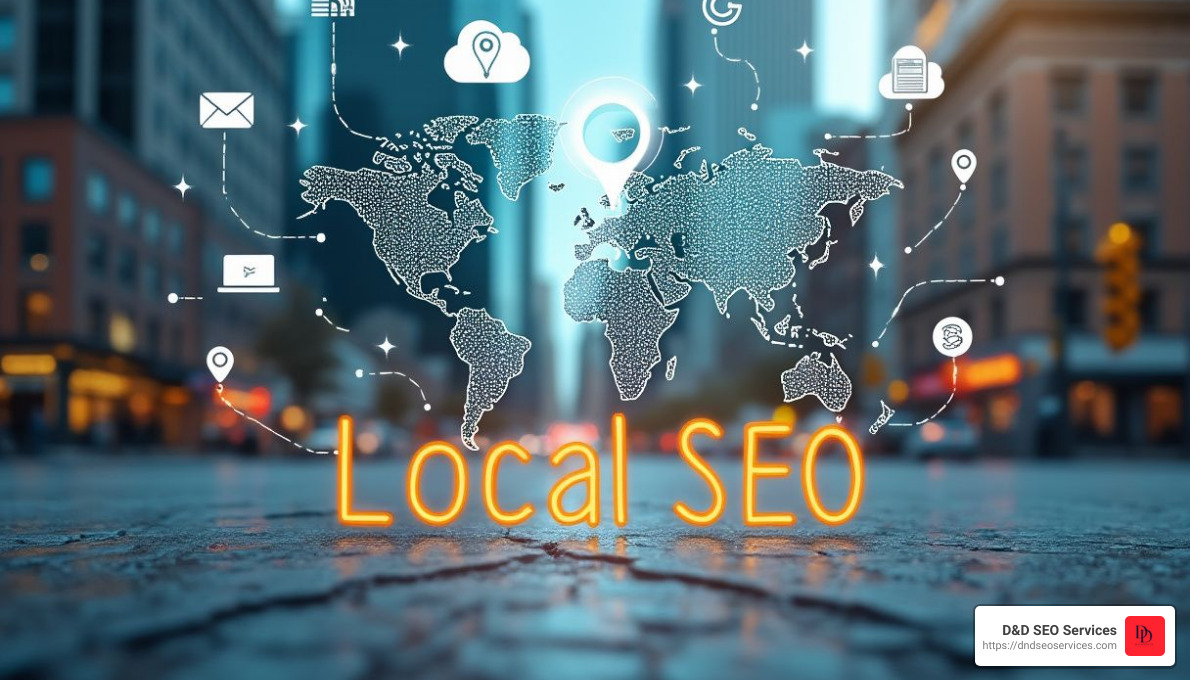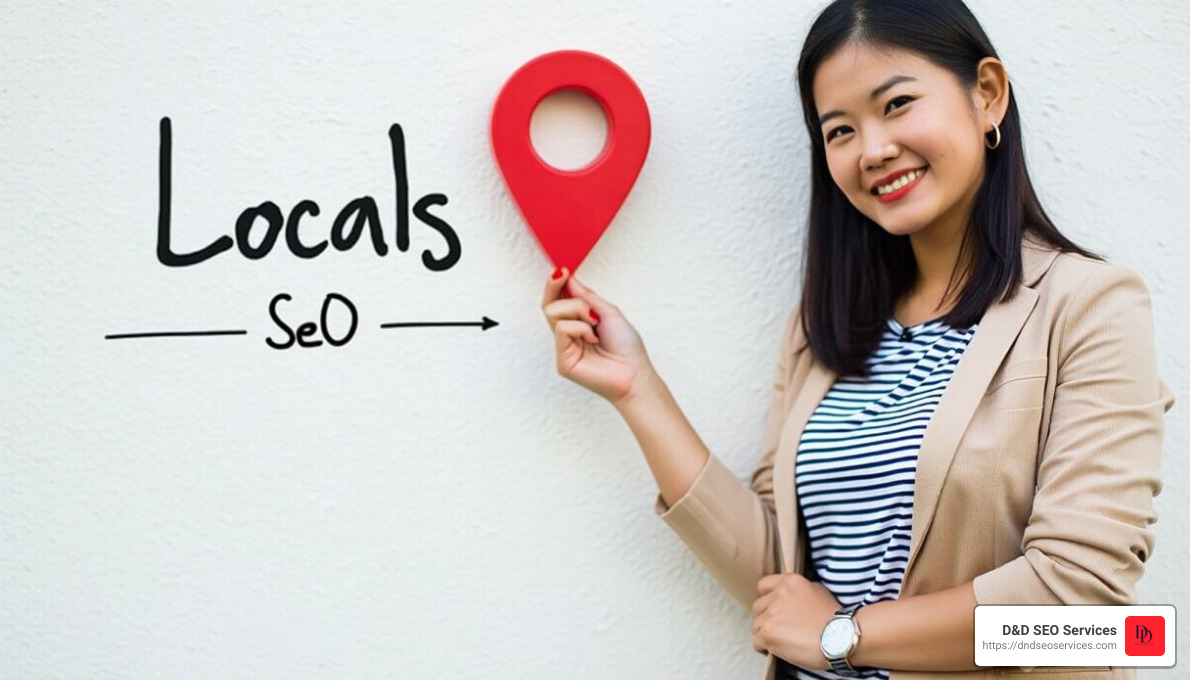Why Local Content Marketing is Crucial for Small Businesses
Local content marketing is a game-changer for small businesses in today’s digital landscape. It’s all about creating and sharing valuable content that speaks directly to your local community. Here are some quick tips to help you understand why it’s important:
- Builds connections with your local audience by addressing their specific needs.
- Establishes trust by positioning you as a local expert.
- Improves search engine rankings to make it easier for nearby customers to find you.
By focusing on these aspects, small businesses can attract more local customers and gain a competitive edge.
Local content marketing helps you connect with your local community, builds trust, and improves your search engine rankings, making it easier for customers to find your business.
I’m Danielle Birriel, founder of D&D SEO Services, where we’ve specialized in empowering local businesses through local content marketing for over a decade. My team and I focus on boosting your online presence so you can connect with your community and grow your business.
Understanding Local Content Marketing
Local content marketing is all about creating and sharing content that is relevant to your local audience. It’s a powerful way to connect with your community, build trust, and improve your search engine rankings.
What is Local Content Marketing?
Local content marketing involves tailoring your message specifically for your area and the people who live there. This could be anything from blog posts and social media updates to videos and podcasts.
For example, a plumber in New York City might write a blog post titled “How to Unclog a Kitchen Sink” that provides detailed steps on fixing a common household problem. This kind of content not only helps local customers but also builds the plumber’s reputation as a trusted local expert.
Examples of Local Content Marketing
Here are some effective examples of local content marketing:
- Neighborhood Marketing: This involves creating content that resonates with the unique characteristics of your neighborhood. For instance, a local shoe store in Charleston, SC, might focus on promoting sandals due to the warm climate.
- Location-Based Marketing: This strategy targets specific geographic areas with relevant content. A restaurant chain like Panera Bread uses its Day-End Dough-Nation program to donate unsold food to local nonprofits, creating a positive local impact.
- Event Coverage: Covering local events and festivals can also be a great way to engage with your community. For example, REI hosts local hiking trips and bike repair classes, promoting these events through their locally optimized website.
The Power of Local Content
Local content marketing is not just about selling products; it’s about building relationships. By addressing the specific needs and interests of your local audience, you can create a loyal customer base.
- Build Trust and Credibility: When you provide valuable information that helps your local audience, you build trust. This trust translates into customer loyalty and word-of-mouth referrals.
- Improve Search Engine Rankings: Local content helps you rank higher in search engine results. This makes it easier for potential customers to find you when they search for services or products in your area.
- Increase Organic Traffic: High-quality, relevant content attracts more visitors to your website. This increased traffic can lead to more sales and business growth.
Case Study: KFC South Africa
KFC in South Africa launched a campaign featuring limited-edition buckets with illustrations by local artist Karabo Poppy. Customers were encouraged to share photos on social media using the hashtag #madeforsharing. This campaign not only boosted local engagement but also showcased KFC’s commitment to supporting local talent.
By understanding and implementing local content marketing strategies, you can effectively connect with your community and drive your business forward.
Next, let’s dive into how to build a local business content marketing strategy that works.
Key Components of an Effective Local Content Marketing Strategy
Local Brand Image
Creating a strong local brand image is essential. Your brand should immediately tell visitors that you cater to their specific area. For example, a URL like Webdeveloper.sydney instantly shows that you target Sydney-based clients.
Your website design should also reflect local preferences. Coca-Cola’s Indian website is a great example of localization. When local customers visit your site, they should feel at home. This builds rapport and increases the chances they’ll take action.
Actionable Blog Content
The quality of your blog content is crucial. It should address the biggest problems your local audience faces. For instance, a legal consultancy in New York might write a blog post titled “Registering a Business in New York: A Step-by-Step Guide.”
Use tools like Ahrefs or BuzzSumo to find content ideas that resonate with your audience. Focus on creating actionable insights that solve local problems.
Local SEO
Local SEO is key to appearing in local search results. Use geo-specific keywords that your potential customers are searching for. Tools like Google Keyword Planner can help you identify these keywords.
Ensure your website is optimized for local search. This includes on-page SEO elements like title tags, meta descriptions, and body content that naturally mention your location. Claim and verify your Google Business Profile, and keep it updated with accurate NAP (Name, Address, Phone number) information, business hours, and high-quality images.
Customer Engagement
Engaging with your local audience builds trust and credibility. Respond promptly to comments, messages, and reviews from local customers. This shows you value their input and are committed to providing excellent service.
Encourage local customers to create content related to your business. User-generated content (UGC) can be a powerful tool for building community and trust. For example, KFC South Africa’s #madeforsharing campaign successfully engaged local customers and showcased local talent.
Content Distribution
Distributing your content effectively is crucial. Use social media platforms to reach your local audience. Regularly post content and use location-specific hashtags to increase visibility. Geo-targeting can also help you reach specific areas.
Publish local content on other websites to broaden your reach. Collaborate with local influencers, organizations, and businesses to acquire backlinks from authoritative local sources. This not only increases visibility but also boosts your SEO.
By focusing on these key components, you can create a local content marketing strategy that effectively connects with your community and drives your business forward. Next, let’s dive into how to build a local business content marketing strategy that works.
Building a Local Business Content Marketing Strategy
Creating a local content marketing strategy requires careful planning and execution. Here’s how you can do it step-by-step:
Understanding the Local Audience
Customer Personas: Start by creating profiles that represent your ideal customers. Look at actual customer data and find commonalities in their locations, goals, and behaviors. This helps you tailor your content to meet their specific needs.
Market Research: Use tools like Google Trends to see what’s trending in your local market. This helps you understand what your audience is interested in.
Competitor Analysis: Check out what other local businesses in your niche are doing. See what content is resonating with their audience and think about how you can do it better.
Social Media Analytics: Platforms like Facebook and Instagram have inbuilt tools to give you insights into your audience’s age, interests, and behavior. Use these insights to refine your content strategy.
Content Creation
Content Types: Create a mix of content types to keep your audience engaged. This can include blog posts, videos, infographics, guides, and more.
Local SEO: Optimize your content for local search by using geo-specific keywords. Include city and state names, local landmarks, and other relevant terms.
Keyword Optimization: Use tools like SEMrush to find the best keywords for your local audience. This will help your content rank higher in search results.
Google My Business: Make sure your Google My Business profile is complete and accurate. Include your business name, address, phone number, and operating hours. This boosts your local SEO and makes it easier for customers to find you.
Content Distribution
Social Media Platforms: Share your content on platforms like Facebook, Instagram, X (formerly Twitter), and TikTok.
Regular Posting: Maintain a consistent posting schedule to keep your audience engaged.
Location-Specific Hashtags: Use hashtags that are relevant to your local area to increase visibility.
Geo-Targeting: Use geo-targeting options provided by social media platforms to reach specific areas.
Collaborations: Partner with local influencers, organizations, and businesses to extend your reach. This can help you acquire backlinks from authoritative local sources.
Performance Measurement
Referral Rates: Track where your traffic is coming from to see which sources are most effective.
Page Views: Monitor the number of views your content is getting. This helps you understand what types of content are most popular.
Downloads: If you offer downloadable content like guides or whitepapers, track how many times they are downloaded.
Revenue Generation: Measure how much revenue your content is generating. This helps you understand the ROI of your content marketing efforts.
Lead Generation: Keep track of how many leads your content is generating. This is crucial for understanding its effectiveness.
Conversion Rates: Measure the percentage of visitors who take a desired action, like making a purchase or signing up for a newsletter.
By focusing on these areas, you can build a local content marketing strategy that effectively engages your audience and drives business growth. Next, let’s explore the benefits of local content marketing for small businesses.
Benefits of Local Content Marketing for Small Businesses
Connection with Audience
Local content marketing allows you to create a strong connection with your audience. By addressing the specific needs and preferences of your local community, you can attract potential customers. For instance, if you’re a coffee shop in Austin, Texas, writing about local events or popular spots in the area can resonate with your community. This localized approach makes your content more relevant and engaging, fostering a deeper connection with your audience.
Trust and Credibility
Providing valuable and informative content helps build trust and credibility with your audience. When you consistently share expert advice and local insights, you position yourself as a reliable source in your industry. Imagine a plumber in Chicago writing about “how to prevent frozen pipes in Chicago winters.” This not only addresses a local concern but also showcases your expertise, making customers more likely to trust your services.
Search Engine Rankings
Local content marketing can significantly improve your search engine rankings. By using local keywords and optimizing your content for local search results, you increase your chances of appearing higher in search engine results pages (SERPs). For example, including phrases like “best coffee shop in Austin, Texas” helps Google understand your geographic focus, boosting your visibility in local searches. Higher rankings lead to more traffic and, ultimately, more sales.
Organic Traffic
Creating relevant and useful content for your local audience can drive organic traffic to your website. When people search for local information or services, your optimized content can attract them to your site. For instance, writing blog posts about local events or answering local questions can draw in visitors who are searching for that specific information. This organic traffic is valuable because it consists of people who are already interested in what you offer.
Customer Relationships
Effective content marketing enables local businesses to engage and build lasting relationships with their customers. Social media posts, blog articles, email newsletters, and videos can all foster a sense of community and encourage two-way communication. Responding to customer comments, questions, and reviews shows that you care about your customers, fostering loyalty and encouraging repeat business. Highlighting local testimonials and case studies also builds trust and showcases your success in the local community.
By leveraging these benefits, local content marketing can help small businesses establish a strong foothold in their local markets, build lasting relationships with their customers, and drive business growth. Next, let’s explore some case studies and examples of successful local content marketing strategies.
Case Studies and Examples
KFC South Africa
One of the standout examples of local content marketing is KFC’s campaign in South Africa. KFC launched limited-edition buckets featuring illustrations by local artist Karabo Poppy. This campaign did more than just sell fried chicken; it celebrated local culture and talent. Customers were encouraged to take photos with the buckets and share them on social media using the hashtag #madeforsharing.
This strategy not only boosted KFC’s local presence but also engaged the community in a meaningful way. The campaign’s success was similar to KFC’s holiday-themed buckets in the US, showing how understanding and catering to local tastes can pay off big time.
Seed Probiotics
Another great example is Seed, a probiotics company that effectively uses local content marketing to build trust and credibility. Seed partnered with local health influencers and hosted events to educate the community about gut health. These events were custom to answer specific questions from the local audience, making the content highly relevant and engaging.
By focusing on local events and partnerships, Seed managed to create a loyal customer base that feels personally connected to the brand. This approach shows how local events can be used to educate and engage, turning attendees into brand advocates.
Local Testimonials
Local testimonials can be incredibly powerful. For instance, Fusion Accountants got featured in an article about factors limited companies should consider when choosing an accounting firm. They provided expert quotes, which added authority to the article. This not only helped them gain visibility but also positioned them as a trusted source in their field.
Similarly, a Texas Monthly blog post featured a local plumber answering the common question, “What to do if your pipes burst?” This kind of content not only provides value to the community but also establishes the business as an expert, making it more likely that locals will turn to them in times of need.
Local Events
Local events offer fantastic opportunities for content creation and distribution. Take REI, for example. The outdoor brand hosts local hiking trips and bike repair classes. They use these events to create content that resonates with their audience. They share event highlights, tips, and customer stories on their social media channels and website.
Another example is The NOW Massage, which uses local influencers to promote their boutique openings. They offer special discounts and host local events, which are then shared on social media to drum up interest and engagement.
By leveraging local events, businesses can create timely, relevant content that not only attracts but also retains local customers. It’s a win-win for visibility and community engagement.
These case studies show how effective local content marketing can be when it’s custom to the community. Whether it’s through local art, educational events, testimonials, or community activities, the key is to create content that resonates with your local audience.
Frequently Asked Questions about Local Content Marketing
What is local marketing and examples?
Local marketing is a strategy that focuses on targeting customers within a specific geographic area. It’s about reaching out to people who are near your business and are more likely to visit in person.
Example 1: The NOW Massage
This California-based massage concept uses targeted local ads on social media and collaborates with local influencers to promote their new locations. Special offers and discounts are also used to attract local customers.
Example 2: Panera Bread
Panera’s Day-End Dough-Nation program donates unsold baked goods to local nonprofits. This not only helps the community but also strengthens Panera’s local presence and brand image.
What is location-based marketing?
Location-based marketing uses data about a consumer’s location to deliver relevant content, advertisements, or services. This could mean targeting ads to people within a certain radius of your business or using geo-targeting features on social media platforms.
Example: REI
REI offers events and activities like hiking trips and bike repair classes that are specific to different locations. Their website is optimized for local searches, and they use location-based mapping strategies to promote these events to nearby customers.
What is the power of local content?
The power of local content lies in its ability to connect with the community on a personal level. It builds trust, credibility, and a sense of belonging among your audience.
Statistics show that over 90% of search engine users are looking for local businesses online. By focusing on local content, businesses can improve their search engine rankings, increase organic traffic, and foster strong customer relationships.
Case Study: KFC South Africa
KFC South Africa used local content to connect with their audience by sharing stories and testimonials from local customers. This approach not only increased engagement but also boosted their brand loyalty within the community.
Local content marketing is a powerful tool for small businesses to stand out and thrive in their communities. By focusing on local needs and interests, businesses can create meaningful connections and drive growth.
Conclusion
At D&D SEO Services, we understand that each business is unique. That’s why we offer personalized strategies custom to meet your specific needs.
Local Markets
Local SEO is more important than ever. According to D&D SEO Services, 97% of search engine users search online to find a local business. Our strategies are designed to help you dominate local search results, ensuring that potential customers in your area can easily find you.
From optimizing your Google Business Profile to building local citations, we make sure your business stands out in local markets.
Online Visibility
Good online visibility is crucial for any business. Our team uses cutting-edge optimization techniques to improve your website’s performance. By integrating tools like Google Analytics, we track user behavior to understand what works and what doesn’t. This data-driven approach allows us to make informed decisions that improve your online presence.
Business Growth
Our ultimate goal is to drive business growth for our clients. We achieve this by focusing on both short-term wins and long-term strategies. Whether it’s through optimizing your website for conversions or implementing effective content marketing, we ensure that every aspect of your digital presence is fine-tuned for success.
Why Choose D&D SEO Services?
With over a decade of specialization in SEO and digital marketing, D&D SEO Services stands as a trusted partner for businesses looking to lift their online presence. Our comprehensive approach ensures that you not only reach your target audience but also engage and convert them.
Ready to open up the power of optimization techniques for your business? Contact us today to get started on your journey to online success!
By integrating these strategies, we help you create a stronger digital narrative that resonates with your audience, fostering growth and sustained customer relationships.








